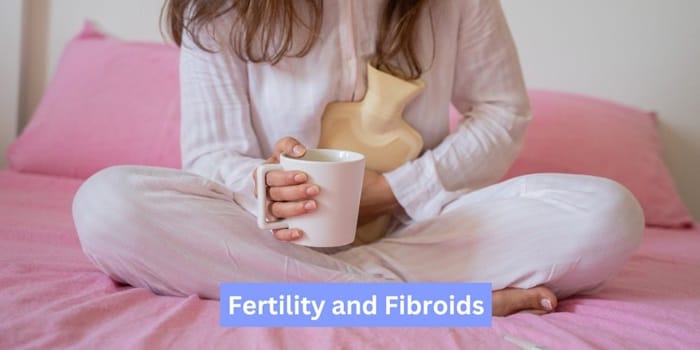Are the small lumps in your uterus, known as fibroids, affecting your fertility? Many women are worried about this question, and it’s important to seek clarity to ensure a smooth pregnancy! In this blog below, I, Pankhuri Gautam, a gynecologist in Jaipur with 10+ years of experience offering dedicated care to women, will provide you with complete details regarding fibroids and fertility.
Fibroids might pose challenges to the conception or a healthy pregnancy. These growths sometimes intervene with fertility by affecting the womb’s environment. They might prevent an embryo from attaching to the uterus lining or pose challenges during pregnancy by altering its position or causing discomfort.
Understanding the relationship between fibroids and fertility is vital for women planning to conceive. Scroll down the details in this blog below to explore!
What Are Fibroids?
Uterine fibroids are benign or simple (noncancerous) muscle tissue tumors in the uterus. They are also called myomas or leiomyomas. Fibroids occur when a single muscle cell in the wall of the uterus multiplies and grows to form a noncancerous tumor. The risk of cancer in fibroids is negligible.
Fibroids can change the shape or size of the uterus and sometimes the cervix (lower part of the uterus). Women usually have more than one fibroid tumor, but single fibroids are possible. Whether fibroids cause symptoms or require treatment depends on their location, size, and number.
Fibroids are usually found in or around the body of the uterus but sometimes in the cervix. There are three main types of fibroids based on where they are found:
- Subserosal are in the outer wall of the uterus (55%)
- Intramural is found in the muscular layers of the uterine wall (40%)
- Submucosal protrude into the uterine cavity (5%)
Fibroids can also be connected to the uterus by a stalk (pedunculated) or attached to nearby ligaments or organs, such as the bladder and bowel. Fibroids are rarely found outside the pelvic cavity.
How Common Are Fibroids?
Fibroids are found in 20% of women of reproductive age but are more common in African-American women (50%-80%). The exact cause of uterine fibroids is unclear, but there is evidence that it may be a combination of genetic, hormonal, and environmental factors.
Can Fibroids Cause Infertility Or Decrease Fertility?
Approximately 5% – 10% of infertile women have fibroids. Their size and location determine whether fibroids affect fertility. Examples include fibroids that are inside the uterine cavity or reaching the inner lining, endometrium (submucosal) or very large (>6 cm in diameter) within the wall of the uterus (intramural).
Most women with fibroids will not be infertile. Women with fibroids and their partners should be thoroughly evaluated to find other problems with fertility before fibroids are treated. A fertility specialist can help assess if fibroids might be hampering conception.
How Do Fibroids Cause Infertility?
There are several ways uterine fibroids can reduce fertility:
- Changes in the shape of the cervix can affect the number of sperm that can enter the uterus.
- Changes in the shape of the uterus can interfere with the movement of the sperm or embryo.
- Fibroids can block fallopian tubes.
- They can impact the size of the lining of the uterine cavity.
- Blood flow to the uterine cavity can be affected, decreasing an embryo’s ability to stick (implant) to the uterine wall or to develop.
What Happens To Fibroids During Pregnancy?
Fibroids are found in 2% to 12% of pregnant women, but not all fibroids get larger or cause problems in pregnancy. If a fibroid grows, it usually does so in the first 12 weeks of pregnancy.
The biggest concern in pregnancy is whether the fibroid will increase the chance of preterm birth or miscarriage. In some cases, fibroids can outgrow their blood supply and cause severe pain. Hospitalization might be needed.
Also, fibroids can change the baby’s position in the uterus. This can increase the risk of miscarriage, preterm delivery, and cesarean section. How fibroids are managed depends on your unique situation and doctor’s recommendations. Surgery is rarely necessary or performed during pregnancy.
If a woman conceives after having a fibroid removed, she should discuss this with the obstetrician who will deliver the baby, as cesarean section may be recommended for the delivery.
Summary
Uterine fibroids are common and can affect fertility in many ways.
- They can affect whether sperm and egg meet.
- They can affect whether an embryo can be implanted.
- They can affect whether a pregnancy can continue.
- They affect the growth and positioning of the baby.
Treatment of fibroids is always individualized and is decided on a case-by-case basis. It is based on the symptoms of fibroids and may improve overall fertility. How and whether you treat your fibroids depends on the severity of your symptoms and your doctor’s recommendations.
Connect with the expert gynecologist, Dr. Pankhuri Gautam, to learn more!


